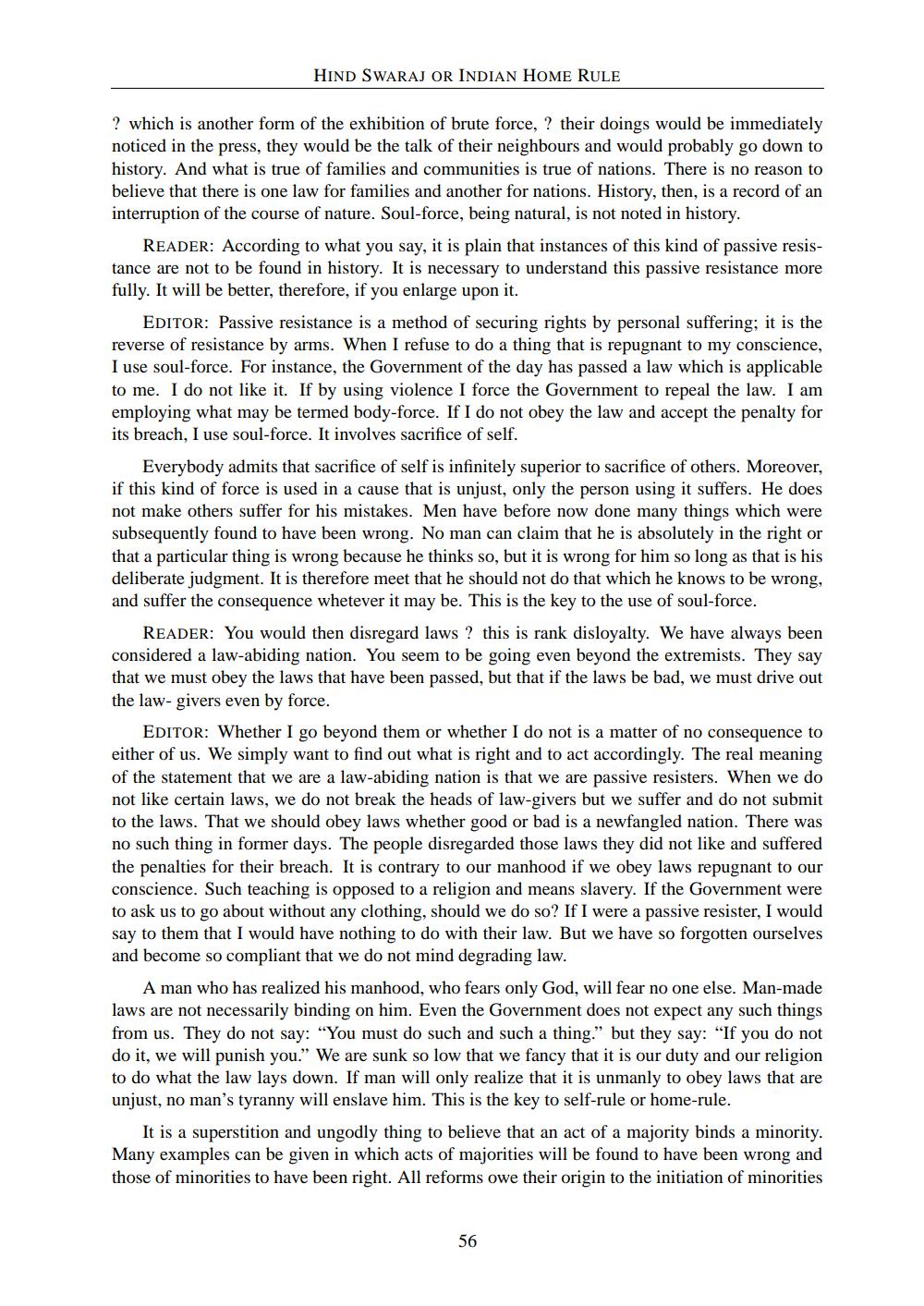________________
HIND SWARAJ OR INDIAN HOME RULE
? which is another form of the exhibition of brute force, ? their doings would be immediately noticed in the press, they would be the talk of their neighbours and would probably go down to history. And what is true of families and communities is true of nations. There is no reason to believe that there is one law for families and another for nations. History, then, is a record of an interruption of the course of nature. Soul-force, being natural, is not noted in history.
READER: According to what you say, it is plain that instances of this kind of passive resistance are not to be found in history. It is necessary to understand this passive resistance more fully. It will be better, therefore, if you enlarge upon it.
EDITOR: Passive resistance is a method of securing rights by personal suffering; it is the reverse of resistance by arms. When I refuse to do a thing that is repugnant to my conscience, I use soul-force. For instance, the Government of the day has passed a law which is applicable to me. I do not like it. If by using violence I force the Government to repeal the law. I am employing what may be termed body-force. If I do not obey the law and accept the penalty for its breach, I use soul-force. It involves sacrifice of self.
Everybody admits that sacrifice of self is infinitely superior to sacrifice of others. Moreover, if this kind of force is used in a cause that is unjust, only the person using it suffers. He does not make others suffer for his mistakes. Men have before now done many things which were subsequently found to have been wrong. No man can claim that he is absolutely in the right or that a particular thing is wrong because he thinks so, but it is wrong for him so long as that is his deliberate judgment. It is therefore meet that he should not do that which he knows to be wrong, and suffer the consequence whetever it may be. This is the key to the use of soul-force.
READER: You would then disregard laws ? this is rank disloyalty. We have always been considered a law-abiding nation. You seem to be going even beyond the extremists. They say that we must obey the laws that have been passed, but that if the laws be bad, we must drive out the law-givers even by force.
EDITOR: Whether I go beyond them or whether I do not is a matter of no consequence to either of us. We simply want to find out what is right and to act accordingly. The real meaning of the statement that we are a law-abiding nation is that we are passive resisters. When we do not like certain laws, we do not break the heads of law-givers but we suffer and do not submit to the laws. That we should obey laws whether good or bad is a newfangled nation. There was no such thing in former days. The people disregarded those laws they did not like and suffered the penalties for their breach. It is contrary to our manhood if we obey laws repugnant to our conscience. Such teaching is opposed to a religion and means slavery. If the Government were to ask us to go about without any clothing, should we do so? If I were a passive resister, I would say to them that I would have nothing to do with their law. But we have so forgotten ourselves and become so compliant that we do not mind degrading law.
A man who has realized his manhood, who fears only God, will fear no one else. Man-made laws are not necessarily binding on him. Even the Government does not expect any such things from us. They do not say: "You must do such and such a thing." but they say: "If you do not do it, we will punish you." We are sunk so low that we fancy that it is our duty and our religion to do what the law lays down. If man will only realize that it is unmanly to obey laws that are unjust, no man's tyranny will enslave him. This is the key to self-rule or home-rule.
It is a superstition and ungodly thing to believe that an act of a majority binds a minority. Many examples can be given in which acts of majorities will be found to have been wrong and those of minorities to have been right. All reforms owe their origin to the initiation of minorities
56




